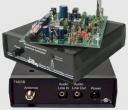Early this morning (01/20/08) I took part in a fascinating radio test, the HAARP – LWA Moon Bounce Experiment It was an attempt to detect high frequency (~7MHz) radio waves reflected from the Moon using regular amateur radio receivers and antennas.
I was quite skeptical of the possibility but still got myself out of bed at 0630z (0030 am CST) to see for myself. The experiment was to last for two hours, one hour on 6.7925MHz and the next hour on 7.4075MHz. Fellow hams will notice that these frequencies are just below and above the 40 meter amateur band, an extremely low frequency for Moon bounce.
The tests consisted of 2 seconds of transmission followed by 3 seconds of silence with this pattern repeated for one hour on each frequency. Since the round-trip travel time for the signal to reach the Moon and return is about 2-1/2 seconds, the echo should occur in the silent period. You can read the other details of the experiment at the link above.
The bottom line: Even with my modest antenna (a multi-band vertical) I was able to hear the signal returning. Not strong, but easily audible. I was really surprised when I first heard the echoes. Even with the transmitter putting out 3.6 megawatts of RF power, I felt it was an amazing feat.
I’ve submitted my report to the people at HAARP and I’m pleased to have made even a tiny contribution to the experiment.
